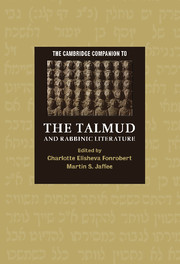Book contents
- Frontmatter
- Introduction: The Talmud, Rabbinic Literature, and Jewish Culture
- Part I: The Conditions of Rabbinic Literary Activity
- 1 Rabbinic Authorship as a Collective Enterprise
- 2 The Orality of Rabbinic Writing
- 3 Social and Institutional Settings of Rabbinic Literature
- 4 The Political Geography of Rabbinic Texts
- Part II: The Genres of Rabbinic Literary Composition
- Part III: Hermeneutical Frames for Interpreting Rabbinic Literature
- Bibliography
- Index
- Source Index
- Series List
2 - The Orality of Rabbinic Writing
from Part I: - The Conditions of Rabbinic Literary Activity
Published online by Cambridge University Press: 28 November 2007
- Frontmatter
- Introduction: The Talmud, Rabbinic Literature, and Jewish Culture
- Part I: The Conditions of Rabbinic Literary Activity
- 1 Rabbinic Authorship as a Collective Enterprise
- 2 The Orality of Rabbinic Writing
- 3 Social and Institutional Settings of Rabbinic Literature
- 4 The Political Geography of Rabbinic Texts
- Part II: The Genres of Rabbinic Literary Composition
- Part III: Hermeneutical Frames for Interpreting Rabbinic Literature
- Bibliography
- Index
- Source Index
- Series List
Summary
Oral teaching and transmission of literary compositions of various degrees of textual fluidity played a prominent role in the shaping of rabbinic culture. Throughout the period leading up to the emergence of the rabbinic movement, both scribal and oral technologies were used in complementary fashion to transmit Jewish tradition. In certain ways, the rabbis were typical of their day in their reliance on oral transmissional techniques. It is noteworthy, however, that though other Jewish groups in antiquity had developed bodies of oral tradition, only the rabbis attributed significance to the fact that they transmitted tradition orally. They alone claimed that the traditional teachings under their guardianship originated in an oral revelation, which had, ever since, been transmitted exclusively by word of mouth. The rabbis highlighted the oral aspect of their teachings by calling it “Oral Torah.” For the rabbis, then, oral instruction was not merely a technology of transmission. Through the concept of Oral Torah (and its partner concept, Written Torah), technologies of transmission took on ideological coloration. This article seeks an understanding of what was at stake for the rabbis when they highlighted the oral, as opposed to written, modes of transmission used in the conveyance of their teachings.
As the rabbis understood the matter, God's revelation to Moses at Mt. Sinai had two components. The written revelation, or Written Torah, had a fixed literary form and was handed down in the formof the twenty two books of the biblical canon. The oral revelation, or Oral Torah, was an interpretive supplement to the written scriptures.
- Type
- Chapter
- Information
- Publisher: Cambridge University PressPrint publication year: 2007
- 6
- Cited by



